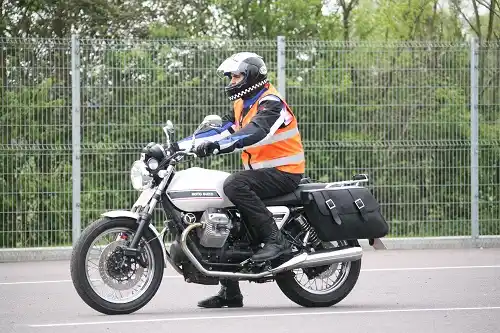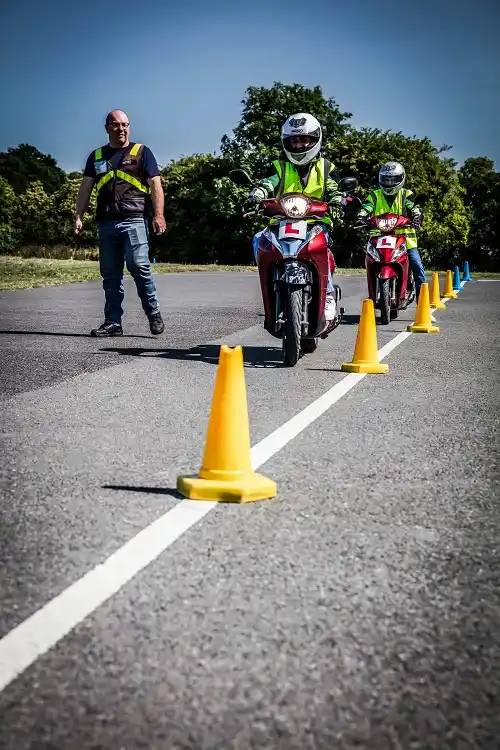Book a motorcycle test in Hensall, North Yorkshire with any of the companies listed here
Click on any of the motorcycle training schools below to view more information and check availability.
Professional Biker Training Hensall
Four Gables, Hensall, DN14 0QA
Approx. distance: 1.1 miles
A2B Motorcycle Training Ltd Church Fenton
East Leeds Airport, Church Fenton, North Yorkshire, LS24 9SE
Approx. distance: 10 miles
Moto Pass Doncaster
Dunsville Primary School, Broadway, Doncaster, South Yorkshire, DN7 4HX
Approx. distance: 10.1 miles
S and K Motorcycle Training Pontefract
Frickley Athletic Football Stadium, Westfield Lane, South Elmsall, Pontefract, West Yorkshire, WF9 2EQ
Approx. distance: 11.2 miles
The CBT and DAS Motorcycle Training School Ltd Doncaster
Marsh Gate, Doncaster, South Yorkshire, DN5 8AF
Approx. distance: 12.4 miles
S and K Motorcycle Training Barnsley
Old Drift Mine, Lund Hill Lane, Royston, Barnsley, South Yorkshire, S71 4BD
Approx. distance: 15.3 miles
Tommy Bee Motorcycle Training Leeds
Alverthorpe WMC, Flanshaw Lane, Wakefield, West Yorkshire, WF2 9JG
Approx. distance: 17.8 miles
Ride Right Motorcycle Training Scunthorpe
Unit 5, Normanby Park Workshops, Scunthorpe, Lincolnshire, DN15 8QZ
Approx. distance: 19.5 miles
3D Motorcycle Training Leeds
Tockwith Airfield, Rudgate, York, North Yorkshire, YO26 7DW
Approx. distance: 19.6 miles
A1 Motorcycle Training Bircotes
Shaw Brothers Ltd, Bircotes, DN11 8DE
Approx. distance: 19.9 miles

Looking for a motorcycle test in Hensall, North Yorkshire?
Have you been looking to book motorcycle training in Hensall? Then Book CBT Now is the place you need to be. We are a highly-experienced team who have sourced the best companies for motorcycle training and testing for over 19 years and can ensure that you are always working with qualified professionals who can help with all of your training and tests. We are happy to suggest various other companies across North Yorkshire for your test or in the surrounding areas of Snaith, Selby and Knottingley.
What are the different types of motorcycle licence I can get in Hensall?
There are 4 main types of full motorcycle licence issued by the DVSA. The first three (AM, A1 and A2 motorcycle licences) have restrictions on the type of moped or motorcycle you can ride, the fourth (the full A motorcycle licence) has no restrictions.
The AM restricted moped licence
The A1 restricted motorcycle licence
The minimum age to take this test is 17. According to the DVSA website it will allow you to ride a "Light motorcycle up to 11 kW (and a power-to-weight ratio not more than 0.1 kW per kg) and 125 cc". This means it's up to a 125 cc motorcycle with some restrictions to make sure it cannot accelerate too fast - a really good idea when you are new to riding a motorbike!
Requirements to take the A1 motorcycle test - You must have a UK provisional or full driving licence, a valid theory test certificate and a valid CBT certificate. Once you have taken this test you will not have to keep renewing your CBT certificate every 2 years, you can ride on motorways and you can take a pillion passenger on the back of your motorbike.
The A2 restricted motorcycle licence
For this licence you need to be at least 19 years of age, have completed your CBT or have had an A1 licence for at least 2 years. As with the A1 test you also need to have a UK provisional or full driving licence and a valid theory test certificate . The main benefit of getting an A2 licence is you can ride a more powerful motorcycle. The law states a "standard motorcycle up to 35 kW (and a power-to-weight ratio not more than 0.2 kW per kg)". So it's a more powerful bike, but still not completely un-restricted. To find A2 legal motorbikes you are best visiting your local motorcycle dealer and asking them to show you the A2 legal bikes, as otherwise it's very difficult to work out just looking at the tech specs.
The full A motorcycle licence, or DAS licence.
This is the licence that allows you to ride almost any motorcycle without restrictions, so it's the ultimate motorcycle licence. No limits on power outputs or power per kg or engine size! It is also called a 'DAS' licence as it can be obtained from the 'Direct AccesS' route. There are two ways you can get this licence:
1) If you are 24 or over you can take the tests for an A licence. You must also have a UK provisional or full driving licence, a valid theory test certificate and a valid CBT certificate.
2) If you are at least 21 years of age and you have held an A2 category licence for at least 2 years. This is sometimes referred to as the 'progressive access' route as you progress from one licence to another.
When taking the test the biggest difference is that you have to use a bigger, more powerful motorcycle. It will have a power of at least 40kw and an engine cc of at least 595 cc. Your local training school will make sure you have the right size bike for your test.
There is also a flowchart (click here) that the DVLA have produced that shows these different licences and how to obtain them.
To get more detailed guidance on what licence is right for you then talk to your local motorcycle training school. You can search for them here and they are qualified to speak to you on the right type of training for you.
What training is available after I have my licence?
You might think that once you have your licence that will be the end of motorcycle training. However, there are may good reasons why you might want to take additional training after you have passed your test, and there is plenty of additional training available.
The Enhanced Rider Scheme (ERS)
This scheme was devised by the DVSA and the motorcycle industry. The ERS course is run by many motorcycle training companies around the UK. It is for anyone who has a full motorcycle licence and wishes to check their safe riding skills. Not only will it make you a better rider but some insurance companies offer cheaper motorcycle insurance if you have been issued with a DVSA Certificate Of Competence. You will receive this certificate at the end of your ERS course if the instructor deems you to be a safe rider. If the instructor feels you need additional training it may be given on the day, or if it is felt you need a larger amount of training then you may need to come back on another day. Although ERS is not a test it is much like a CBT: provided you demonstrate a safe level of riding and knowledge during the day then you will be issued with your certificate. You can view a short video about ERS here.
BikeSafe
Spend a day with a police motorcyclist and without any danger of being arrested! Yes, the police force run training days for any rider who has a full motorcycle licence. The day involves some classroom theory as well as on road riding assessments. You will ride with a police motorcyclist and other riders on the same course as you. There is no test at the end of the day, it's designed to be enjoyable, interactive and above all to make you a better rider. For more information on BikeSafe courses and availability click here.
Advanced Training
Most motorcycle training companies offer advanced training, you can search for your local motorcycle training company here. Advanced training covers a wide range of subjects including progressive riding, advanced cornering, carrying a pillion passenger and motorway riding.
Rusty Riders
So you learnt to ride a motorcycle a while ago and have taken a break? Not sure how to get back on a bike? Not sure of all the new type of motorcycles available now and need some advice? They all go under the term 'rusty riders' meaning it's been a while since you last rode a bike and you need some help. Contact your local motorcycle training company to ask them about training for returning to biking.
Motorcycle maintenance
You may be able to ride a motorcycle perfectly but do you know how to look after one? What about that chain - how often should you lube it and when should you re-tension it? What about the suspension? Altering the stiffness of the suspension? Checking the oil level? Yes, these are all things you will need to know to look after your lovely new motorcycle or moped. There are some motorcycle training companies that run motorcycle maintenance courses. Just contact your local motorcycle training school and ask them about motorcycle maintenance.

If I have a full car driving licence what motorcycle can I ride?
This depends on when you passed your driving test:
If you passed your car driving test before 1st February 2001
In this case you can ride a moped up to 50 cc without Learner plates and without needing a CBT. If you want to ride anything bigger then you will need to get your CBT certificate. Then you will be able to ride a restricted motorcycle up to 125 cc with Learner plates displayed.
If you passed your driving test on or after 1st February 2001
You must obtain a CBT certificate before you can ride anything. Once completed you can ride a moped or restricted motorcycle up to 125 cc.
How do I get the right training in Hensall for the A2 motorcycle licence?
The A2 motorcycle licence is a restricted licence you can get when you are 19 or over. It is popular amongst 19 to 24 year olds as it is the only licence that allows you to get on a more powerful motorcycle at that age. It is essential that you get the right training for this licence as without it you are likely to hurt yourself or even worse, someone else. Use this websiteto enter your postcode and search for your local motorcycle training school. They are all fully qualified to advise you on the training you will need. Although saving money is something everyone wants to do, the right training will save your life. Therefore don't just focus on price, look at the quality of training on offer and the standard of training.